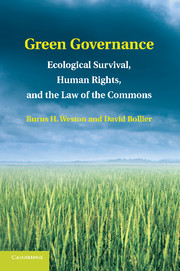‘This book will stimulate wide interest, far larger than the average law work. Academics in the legal profession, particularly those focusing on human rights, the environment, or governance, will find this a welcome addition. Similarly, scholars in other fields, such as political science, environmental studies, or geography will find this book useful … An absence of jargon makes this book accessible to a wide audience, by clearly explaining complex concepts such as commons governance. [Green Governance] is not only a new tactic for legal and political scholars. [It] is an engaging work that suggests a broader way of thinking about and governing the natural environment. The author’s combination of human rights, vernacular law, and commons governance are a stark contrast to the traditional state and market-based approaches that dominate traditional discussions … these suggestions … represent new ideas at a time when there is a desperate need for change.'
Scott McKenzie
Source: Global Policy
‘This book undertakes an ambitious project: redesigning the way the world should be governed and providing a strategy for achieving it. [B]oth the redesign and the strategy are innovative [and] well supported. [T]he authors have succeeded in providing a convincing case that their proposals are achievable. This book is an excellent contribution to the debate about future human governance of the natural environment and should be read by anyone interested in the survival of humanity on earth … [T]he authors argue for locally based, participatory, self-organized governance structures … nested within a global governance architecture that can successfully govern the global commons. While this is intensely challenging, Weston and Bollier argue that only a fundamental change in the way that we think and act, for example in relation to governance, can address the fundamental threats to our existence.’
Catherine Iorns Magallanes
Source: Journal of Human Rights and the Environment
‘The idea that our current trajectory may lead to environmental disaster has become part of popular culture, but it has yet to convince us to change course. No alternative to our growth-oriented economic system has achieved widespread support, perhaps because none has seemed both environmentally satisfactory and politically viable. With their new book, Burns Weston and David Bollier aim to change that. They put forward a proposal - [‘green governance’] - they hope will lead to a revolution in environmental governance … Their proposal … has two interwoven strands: (1) an enlarged understanding of human rights, and (2) a systematic encouragement of a commons approach to environmental management of common-pool resources (CPRs), which would supplement and offset the State and Market approaches … Whatever the fate of the commons as an organizing principle, it seems evident that human rights are fast becoming an integral part of environmental governance.’
John H. Knox
Source: American Journal of International Law
‘The authors offer us a truly grand vision of world governance without world government, which is at once global and local, cohesive yet decentralized, radically new yet rooted in history, and based on a conception of human rights which emphasizes the collective over the individual. It is not just different, it is revolutionary. The essential proposition is that humanity can and must replace the ‘State/Market’ system which it has devised over time, based on its ‘unthinking, unaware avarice’, with a new and more responsible system of collective governance built on humanity's more noble and truly communitarian values … This book is essential reading for all those - lawyers or not - working in the field. It succeeds admirably in forcing us to reconsider the overall environmental crisis and to contemplate possible solutions from a new and challenging perspective.’
David P. Stewart
Source: The Georgetown International Environmental Law Review
‘When a vital body of existing policy and law has run its course, the need for reinvention becomes urgent. So it is with environmental law and policy. It is therefore [exciting] that two enormously well-informed and creative thinkers, Burns Weston and David Bollier, have joined forces to produce this breakthrough in environmental governance. Their book is a landmark in our thinking about rights-based environmentalism and the law of the commons and how these fields can combine in a powerful synthesis. We must take these ideas very seriously indeed. Highly recommended.’
James Gustave Speth - Vermont Law School, and former Dean, Yale School of Forestry and Environmental Studies
‘This indispensable book, written with passion and a sense of urgency, responds creatively and convincingly to the greatest ecological threat that has ever faced the human species. Relying on their profound knowledge of environmental issues, law, and human rights, Burns Weston and David Bollier brilliantly depict and propose a drastically new paradigm of governance that has the potential to save the peoples of the world from a catastrophic future. Their proposal is a major scholarly addition to the climate change literature that deserves the widest possible readership.’
Richard Falk - Albert G. Milbank Professor of International Law Emeritus, Princeton University
‘Burns Weston and David Bollier have written a bold, imaginative and ambitious book. The planet is in peril and its capacity to sustain life under threat. Market economics, international law and state sovereignty have all failed us. A new approach is needed and that lies in a twin approach: a rights-based governance system for the Earth’s resources and development of an ecological commons template for environmental management. The book is well researched and closely argued. It deserves our rapt attention in the struggle to find a way through.’
Sir Geoffrey Palmer - former Prime Minister and Minister for the Environment, New Zealand





